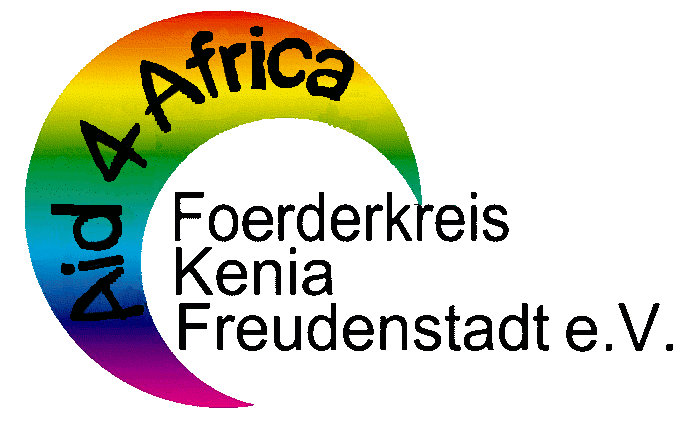
|

Report on our 2012 Project Journey to Kenya — Visits to the Kenyan Indian Ocean Coast
Office of Foerderkreis Kenia Freudenstadt e.V., Germany. Updated version. Original English version first published May 31, 2012. Page 3/4.
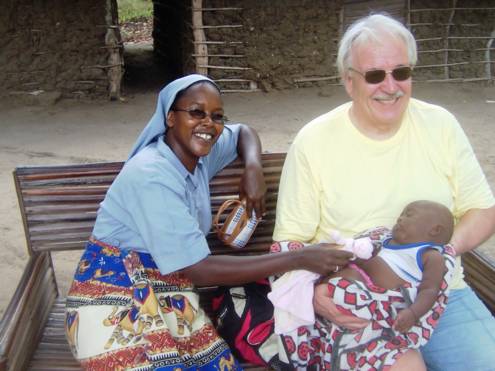
Society member while visiting the catholic sisters in Baharini.
|
Sunday, March 11, 2012 (continued): Baharini
In the late afternoon hours, our driver safely took us to Baharini, situated in the vicinity of the Indian Ocean coast (in Swahili, the literal translation of "baharini" is "at the coast"). He himself rode his empty car back to Malindi. After boarding our rooms, the sisters invited us to their dining hall in the sisters' building where we had supper.
Monday, March 12, 2012: Visit to Two AIDS Orphan Families
The sisters gave us an opportunity to visit the homes of two AIDS orphan families. The first family has ten, the other seven children whose parents have died of AIDS and are therefore not able anymore to care for their children. For this reason, the family's oldest children took over, now caring for their younger brothers and sisters with their respective grandmother taking part within their capabilities in the education of their grandchildren. At the time of our visit, the first family lived jammed up in a run-down mud-house with a leaky roof. Their beds consisted of a makeshift-like assembly of wooden boards. During the night, their hut's second room is being used as a stable for two goats and some chicken.
|
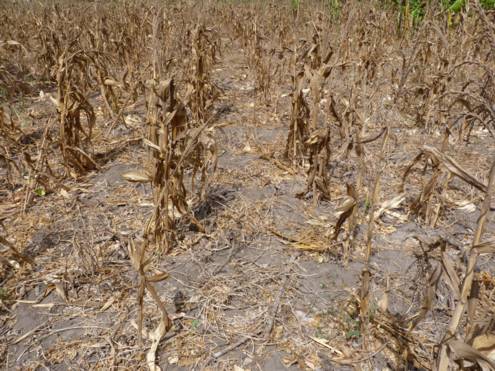
Parched maize field near Baharini — dried up due to drought.
|
Due to lack of money, two children of the other family cannot afford attending school while two sons are attempting to make some money by casual jobs. For this particular family, the day-to-day struggle for survival is especially hard. Our donors' financial support is one of the sources of income enabling the sisters to provide for and care for some 132 AIDS orphans. Regular visits by the sisters are absolutely needed in order to hand out to the families clothing, food, and pay, in some selected cases, their school tuition fees. They are also trying to provide some level of primary health care.
To get an impression of the environment they are living in, we accompanied the sisters walking to a special oasis-like depression. On our way we spotted parched cotton and maize fields that were completely dried up due to the drought. Despite the aridity, however, an irrigation scheme made possible the cultivation of vegetables in the depression area. We spotted a well, operated not by our society but by the local population, which is providing the water needed for agricultural purposes. We observed that the irrigation scheme was energized by a gas pump transporting water to the individual vegetable plots through a system of plastic irrigation pipes. Among the vegetables they are cultivating we identified "suma wiki", a spinach-like vegetable, red and green peppers, eggplants, and beans. The well appeared to be a meeting place for all generations. At around 4:30 p.m., we accompanied the sisters to chill out at the near Indian Ocean.
|
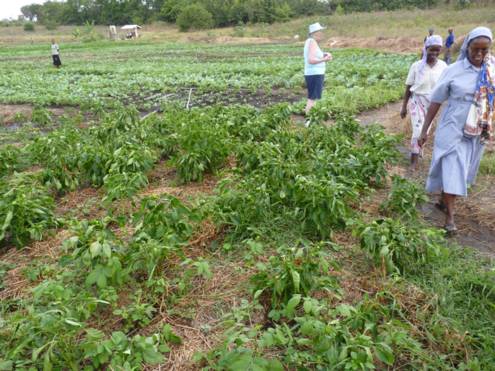
Cultivation of vegetables in the irrigated depression.
|
|
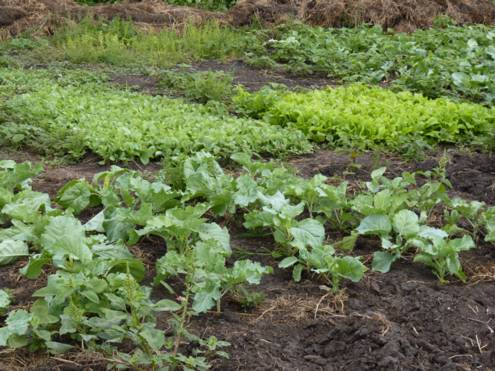
Cultivation of suma wiki, a spinach-like vegetable.
|
|
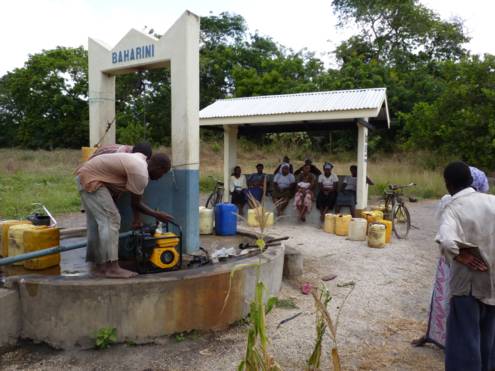
Motorized well that is used by the local population for irrigating the depression.
|
Tuesday, March 13, 2012: Baharini
This day included a visit to the girls' secondary school and our having lunch with the AIDS orphans. In the morning, we were woken up by the sisters' beautiful singing. After breakfast we met the director of their congregational secondary school, a boarding school which, at the time of our visit, was educating and housing 101 students. We were especially impressed by the students' apparent discipline and their computer course room, which was equipped with approximately 15 personal computers. We were told that "Sacred Heart Girls' Secondary School" would rank fourth place in comparison with eleven similar schools in the lower Tana River District. We were also thrilled by the school's engineering facilities that included a solar panel system used for lighting and for energizing their laptop computers, and a large rainwater cistern. The school requested our society to pay the tuition fees for two additional A level students who are soon about to graduate without their parents being able to pay the remaining school fees. The director again wholeheartedly expressed her thanks for our society's donors' support and furthermore requested the society to also financially support the study of medicine of one specially gifted graduate of the school. Our society members will discuss this topic in the months following our return to Germany.
|
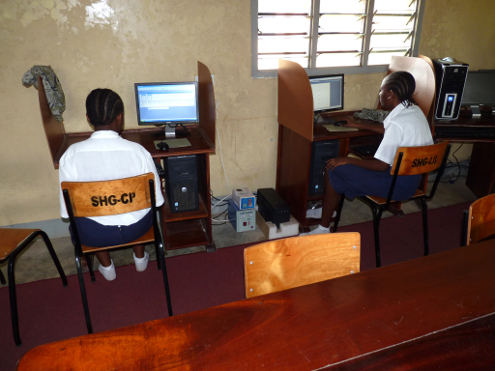
Computer education in the girls' secondary school.
|
|
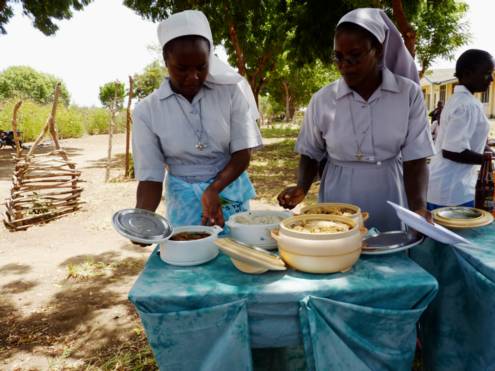
Lunch with the sisters, the AIDS orphans and several other individuals.
|
After having visited the school, a large celebration for the AIDS orphans and the members of our society took place in front of the sisters' building at 11 a.m. In the morning they had butchered a goat for being able to give all those attending a sizable portion of goat meat. The community's meal and all beverages were paid for by the society. Numerous children stowed away half of their lunch into plastic bags, which they later on took back home for the rest of their families. In the morning, many of the 50 AIDS orphans attending had hiked a distance of more than 5 miles to arrive at the celebration in due time. The children enjoyed all of us with singing, dancing, rhyming and riddles. One of the Catholic sisters held a speech after which our society's project coordinator introduced himself and the society. This was followed by a speech of the head of the local church council. She expressed her thanks for many years of support from our society, which has become a reliable contribution to the finances of their AIDS orphan project. A religion teacher also spoke words of gratitude. After this they distributed lunch including the beverages — something highly anticipated by the children. Towards the end of the celebration, the Catholic parson and his driver joined in, also expressing his gratitude towards the society for our support. Finally, we handed out some writing materials to the children. For all participants this successful celebration ended all too early. In the late afternoon, we made a short excursion with two Catholic sisters to nearby Lake Kenyatta, which is located in a nature reserve far from the usual tourist routes. We found that this was the home of a sizable hippopotamus family. We had to wait until dusk, however, before being able to spot several hippos. In addition to this, we observed hundreds of birds with their colorful plumage on the Lake's sandy beaches and were amazed by a wonderful and awesome tropical sunset. Upon dusk, the sisters in their SUV safely drove us back to their sister's building.
|

Excursion to Lake Kenyatta with the catholic sisters.
|
|
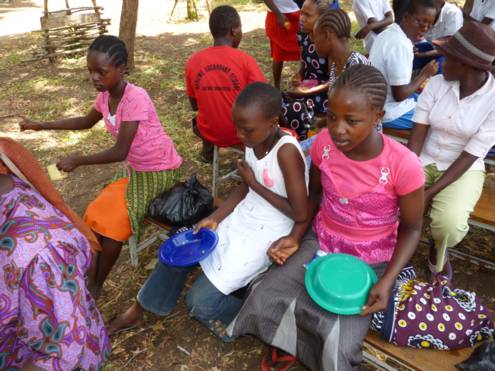
AIDS orphans.
|
|
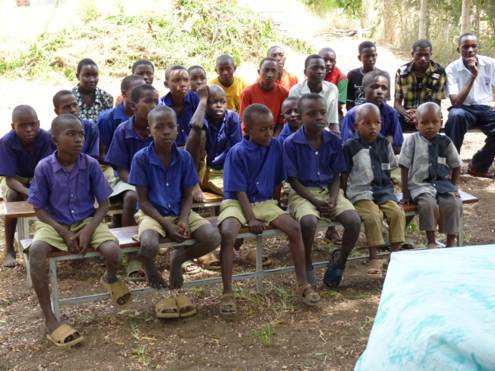
AIDS orphans attending lunch.
|
|
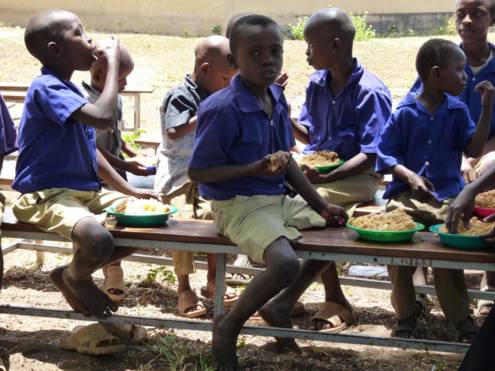
During lunchtime.
|
|
Wednesday, March 14, 2012: Lamu
After breakfast, we bid the sisters farewell in order to take a ride on a local taxi, called a "Matatu", to Mokowe ferry station where we took the ferry boat to Lamu Island, which is situated in the Indian Ocean. After boarding a local lodge, part of us participated in an informative two-hour long guided tour through the "Lamu old town" world heritage site. Due to the sudden apparition of medical problems on the part of one of our group members, we were forced to discontinue our stay in Lamu on short notice and canceled all dates planned there. Instead, we had to book an early return flight back to Malindi.
|
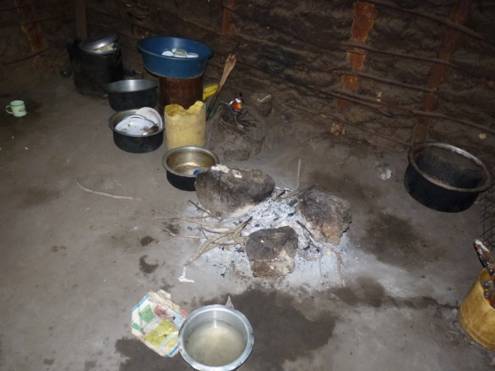
View of kitchen in an AIDS family's home.
|
|
|

|
